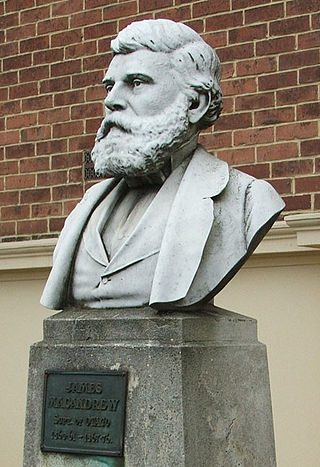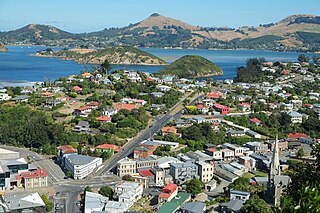Related Research Articles

Otago Harbour is the natural harbour of Dunedin, New Zealand, consisting of a long, much-indented stretch of generally navigable water separating the Otago Peninsula from the mainland. They join at its southwest end, 21 km (13 mi) from the harbour mouth. It is home to Dunedin's two port facilities, Port Chalmers and at Dunedin's wharf. The harbour has been of significant economic importance for approximately 700 years, as a sheltered harbour and fishery, then deep water port.

Dunedin is the second-largest city in the South Island of New Zealand, and the principal city of the Otago region. Its name comes from Dùn Èideann, the Scottish Gaelic name for Edinburgh, the capital of Scotland. The city has a rich Māori, Scottish, and Chinese heritage.

James Macandrew was a New Zealand ship-owner and politician. He served as a Member of Parliament from 1853 to 1887 and as the last Superintendent of Otago Province.

Port Chalmers is a town serving as the main port of the city of Dunedin, New Zealand. Port Chalmers lies ten kilometres inside Otago Harbour, some 15 kilometres northeast of Dunedin's city centre.

Dunedin railway station is a prominent landmark and tourist site in Dunedin, a city in the South Island of New Zealand. It is speculated by locals to be the most photographed building in the country, as well as the second most photographed in the southern hemisphere, after the Sydney Opera House.

The Main South Line, sometimes referred to as part of the South Island Main Trunk Railway, is a railway line that runs north and south from Lyttelton in New Zealand through Christchurch and along the east coast of the South Island to Invercargill via Dunedin. It is one of the most important railway lines in New Zealand and was one of the first to be built, with construction commencing in the 1860s. At Christchurch, it connects with the Main North Line to Picton, the other part of the South Island Main Trunk.

The Port Chalmers Branch was the first railway line built in Otago, New Zealand, and linked the region's major city of Dunedin with the port in Port Chalmers. The line is still operational today.

The Opua Branch or Otiria-Opua Industrial Line, partially still operational as the Bay of Islands Vintage Railway, is a former section of the North Auckland Line in the Northland Region of New Zealand, between Otiria and the Bay of Islands township of Opua. The first section was constructed as a bush tramway in 1867 and converted to a railway in the next decade. Today the railway is partially used by the Bay of Islands Vintage Railway, which runs tourist services between Kawakawa and Te Akeake. The line's centrepiece is the section where it runs down along the main street of Kawakawa.

Dunedin North is a former New Zealand parliamentary electorate, which returned one Member of Parliament (MP) to the New Zealand House of Representatives. It was established for the 1905 election and has existed since. It was last held by David Clark of the New Zealand Labour Party, who replaced the long-standing representative Pete Hodgson. It was considered a safe Labour seat, with Labour holding the seat for all but one term (1975–1978) since 1928. In the 2020 electoral boundary review, Otago Peninsula was added to the area to address a population quota shortfall; with this change the electorate was succeeded by the Dunedin electorate in the 2020 election.

Thomas Dick was a 19th-century New Zealand politician. Originally a merchant, he worked in London and then represented his firm on Saint Helena for seven years. From there, he was sent to Dunedin as the company's representative; he emigrated with an extended family. He soon became involved in politics and was Superintendent of Otago Province from 1865 until 1867. Over a period of 24 years, he represented various Dunedin electorates in Parliament and was Colonial Secretary (1880–1884), Minister of Justice from 1881 to 1882, and Minister of Education from 1881 to 1884. A deeply religious man, he was involved in many church affairs. He was one of the founders of Hanover Street Baptist Church; the building is now classified as Category I by Heritage New Zealand.
Chalmers, originally Port Chalmers, was a parliamentary electorate in the Otago Region of New Zealand, from 1866 to 1938 with a break from 1896 to 1902. It was named after the town of Port Chalmers, the main port of Dunedin and Otago.
Pensioner Settlements was a 19th-century parliamentary multi-member electorate in the Auckland region of New Zealand, from 1853 to 1870.
Northern Division was a two-member parliamentary electorate in the Auckland Region, New Zealand from 1853 to 1870.
The 4th New Zealand Parliament was a term of the Parliament of New Zealand.
David Forsyth Main was a 19th-century member of parliament in Otago, New Zealand.
State Highway 88 (SH 88) is a New Zealand State Highway connecting the city centre of Dunedin with Port Chalmers, which is the location of Dunedin's main port facilities and home of one of New Zealand's major container terminals. It is roughly 12 km long.
Matoaka was a 1092-ton wooden New Brunswick full-rigged ship built in 1853 for Willis, Gunn, & Co. She was sold to Shaw, Savill, & Albion by 1859. Between 1859 and 1869 she made eight voyages to New Zealand. Her fastest run from Bristol to Lyttelton, New Zealand was 82 days in 1862. On 13 May 1869 she left Lyttelton for London under Captain Alfred Stevens with 45 passengers and 32 crew but was never seen again. In 1865 she was classed as 1322 tons.
The 1866 Port Chalmers by-election was a by-election held on 15 December 1866 during the 4th New Zealand Parliament in the Otago electorate of Port Chalmers.
The 1867 Raglan by-election was a by-election held on 4 June 1887 in the Raglan electorate during the 4th New Zealand Parliament.
The Port Chalmers time ball is a Victorian maritime Greenwich Mean Time signal located on Aurora Terrace on top of Observation Point in the port of Port Chalmers, New Zealand. It was established in 1867 by the Otago Provincial Council. The time ball fell precisely at 1 p.m. daily. Originally triggered by a grandfather clock, from 1882 onwards a telegraph signal from Wellington took over this function. It was removed in 1970, but a replacement was restored to service in 2020.
References
- ↑ "Port Chalmers Election". Otago Daily Times. No. 1698. 10 June 1867 – via Papers Past.
- ↑ "Daily Southern Cross". Daily Southern Cross . 14 June 1867.